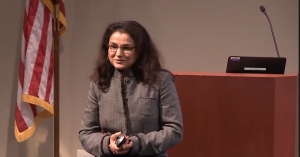by Franklin Templeton Investments
Q: Growing up, what did you aspire to be?
Desai: An architect. I always loved design and architecture, and still do. But I was also fascinated by economics, politics and policy—and so eventually I followed my other passion, economics and finance.

Q: What was your very first job, and what lessons did you learn from it?
Desai: Working in our garden under my father’s supervision. He had taken to gardening with great passion and a scientific approach, and I was acting as assistant gardener/general dogsbody, weeding, digging, planting, and pruning—he was quite the taskmaster! It taught me three things. First, that to achieve your goals you need to be ready to put in seriously hard work. Second, that attention to detail is crucial. And third, that to succeed you need to do your research first, and if you do the research well you can master almost any field.
Q: You worked in academia and at the International Monetary Fund (IMF). How did these experiences shape your views today as an investment manager?
Desai: At every stage of my career, I’ve learned something extremely valuable that applies to my current role at Franklin Templeton. My work in academia taught me how to research and understand a variety of issues, how to apply analytics in a targeted and effective way, and how to clearly communicate ideas. At the IMF, I worked on adjustment programmes in many emerging market countries and learned the complexity of policymaking, which is crucial to understand how countries are likely to react in difficult circumstances. I’ve also worked in investment banking and in the hedge fund world. I’ve had exposure to most aspects of financial markets in a variety of market conditions, from the “irrationally exuberant” times to the depths of global financial crisis a decade ago. I’m enormously fortunate and privileged to be able to lead a very strong team at Franklin Templeton and work closely with extremely talented colleagues.
Q: You’ve lived on three different continents and travel a lot for your job. Is there anything in your travels/experiences that really surprised you about a particular place or people?
Desai: I don’t even know where to start, because one of the best things about visiting and living in different countries is that no matter how well you think you know them, they always surprise you. But I will give you one example that might be especially relevant. I lived for three years in Milan, Italy. Before we moved there, my Italian husband warned me, “Milan is not really the Italy you expect.” I laughed at him. And then I realised he was right. Italy is a small country, but the differences across regions and cities can be enormous. For historical reasons, Milan has a lot more in common with the efficiency of Munich and Vienna than with Rome’s “dolce vita”. Which means that getting granular, understanding and appreciating the local reality and culture, is extremely important and rewarding in life. And in investing.
Q: What advice would you tell young women interested in a career in economics or financial services?
Desai: I would give them three pieces of advice. First, believe in yourself—if you put in the hard work and are passionate about what you do, you can achieve a lot. Don’t let anyone tell you otherwise. Second, take risks and take chances. Whether it is a new assignment, a new job or a change in careers, taking risk is essential to find new opportunities, grow professionally and succeed. If an opportunity comes your way, take it and believe you can succeed even if you don’t feel 100% confident. Finally, look for the best role models and mentors who can help guide your career, women or men. I do think we need to do a lot more to bring more women into the industry, and I think the first step should be encouraging young girls to study math and scientific subjects that will put them in a stronger position to build successful careers, not just in the investment industry but also in other industries that require strong technical skills.
Q: What is the hardest part of your current role, and what is the most rewarding?
Desai: Our fixed income team has an incredible depth and breadth of talent. At the same time, our entire industry is undergoing disruptive change, and we operate in a macro environment of unprecedented economic and geopolitical volatility. I see my greatest challenge as being able to leverage the talent of our teams in the most effective way, and making sure everyone feels empowered and excited to do more, to come up with new ideas to help our clients and to help us succeed. And working with so many talented teams, both in the fixed income team and in Franklin Templeton overall, is by far the most rewarding aspect of my current role.
Q: I understand quantitative analysis/data science is something you are very interested in right now. What excites you about it?
Desai: I believe quantitative insights complement fundamental analysis. Quant provides breadth, while active fundamental analysis provides depth. Quantitative approaches can identify patterns in enormous amounts of data and cover the entire investable universe—something traditional analysis cannot achieve due to scale. Fundamental analysis provides a deep understanding of the complexity of individual issuers, securities and sentiment that data alone cannot achieve.
Since being named CIO of Franklin Templeton Fixed Income, my focus has been on bringing every advantage possible to the table and ensuring those ideas are disseminated and integrated across the entire team. Quant is one of the areas I’m really excited about in terms of differentiating ourselves as investment managers and preparing our team for success in the next 20 years and beyond.
Being headquartered in San Mateo, California, we are immersed in an innovation ecosystem within Silicon Valley. This has made it immediately clear to us how technology breakthroughs and data science are disrupting entire industries, including asset management. In today’s world, if you aren’t continually evolving technologically, you risk becoming obsolete. Our CEO, Jenny Johnson, has been an early evangelist of this paradigm. Moreover, our location has given us great access to data science talent and the ability to collaborate with some of the most interesting startups in fintech.
We’ve implemented an enhanced “active quant” investment process that includes three proprietary models of quantitative analysis. The first model is focused on high-conviction view formulation, where we translate our macroeconomic views into quantifiable and measurable forecasts for sectors and market impact. The second model utilises a proprietary optimisation process that seeks the optimal sector weights with the goal of producing the highest risk-adjusted, excess-return profile. Finally, the third model is for security selection in certain sectors, where we combine our fundamental views with a dynamic-tilting, factor-based model and quantitative security rankings to help construct portfolios and select individual securities.
We believe we have found the “sweet spot” that balances quantitative science with fundamentals-based active management, and that this will help us navigate challenging investment environments as we seek to generate consistent alpha, and ultimately serve our clients better. That’s extremely exciting to me.
Q: How do you deal with the pressures of the job, which is highly performance-oriented?
Desai: I don’t have a magic recipe here, only common sense. We work in an extremely competitive industry in an increasingly competitive global economy. We all face an enormous amount of pressure. To deal with this pressure, the first thing to do is to prioritise, and focus on doing what you have to do, and do it well—like a basketball player shooting a crucial free throw, you don’t think about the crowd, you just focus on the ball and the basket. The second is to trust your team, to remember that you are not alone. And the third, equally important but even harder, is to be able to disconnect, carve out time with your family, friends and hobbies so that your mind can disconnect from work completely. This has become extremely hard in these days of smartphones, but it is crucial, because unless you allow your mind to disconnect you cannot think clearly and you cannot be truly creative when you need to be.
Q: Any passions or hobbies outside of work you would like to share?
Desai: I still love architecture and design. I still love gardening, especially now that I have promoted myself to head-gardener! And, I love cooking and baking. In between the IMF and the financial sector I took a six-month break and did a professional pastry chef degree at the Cordon Bleu school in London (which I passed with distinction!), so on the weekends there is always some cooking and baking going on. Doing all the research on cookbooks and websites first, of course!
Important Legal Information
This material is intended to be of general interest only and should not be construed as individual investment advice or a recommendation or solicitation to buy, sell or hold any security or to adopt any investment strategy. It does not constitute legal or tax advice.
The views expressed are those of the investment manager and the comments, opinions and analyses are rendered as of publication date and may change without notice. The information provided in this material is not intended as a complete analysis of every material fact regarding any country, region or market.
Data from third party sources may have been used in the preparation of this material and Franklin Templeton (“FT”) has not independently verified, validated or audited such data. FT accepts no liability whatsoever for any loss arising from use of this information and reliance upon the comments, opinions and analyses in the material is at the sole discretion of the user.
Products, services and information may not be available in all jurisdictions and are offered outside the U.S. by other FT affiliates and/or their distributors as local laws and regulation permits. Please consult your own professional adviser or Franklin Templeton institutional contact for further information on availability of products and services in your jurisdiction.
Issued in the U.S. by Franklin Templeton Distributors, Inc., One Franklin Parkway, San Mateo, California 94403-1906, (800) DIAL BEN/342-5236, franklintempleton.com—Franklin Templeton Distributors, Inc. is the principal distributor of Franklin Templeton’s U.S. registered products, which are not FDIC insured; may lose value; and are not bank guaranteed and are available only in jurisdictions where an offer or solicitation of such products is permitted under applicable laws and regulation.
What Are the Risks?
All investments involve risks, including possible loss of principal. The value of investments can go down as well as up, and investors may not get back the full amount invested. Bond prices generally move in the opposite direction of interest rates. Thus, as prices of bonds in an investment portfolio adjust to a rise in interest rates, the value of the portfolio may decline. Investments in foreign securities involve special risks including currency fluctuations, economic instability and political developments. Special risks are associated with foreign investing, including currency fluctuations, economic instability and political developments; investments in emerging markets involve heightened risks related to the same factors. Actively managed strategies could experience losses if the investment manager’s judgment about markets, interest rates or the attractiveness, relative values, liquidity or potential appreciation of particular investments made for a portfolio, proves to be incorrect. There can be no guarantee that an investment manager’s investment techniques or decisions will produce the desired result.
Get more perspectives from Franklin Templeton delivered to your inbox. Subscribe to the Beyond Bulls & Bears blog.
For timely investing tidbits, follow us on Twitter @FTI_Global and on LinkedIn.
This post was first published at the official blog of Franklin Templeton Investments.











